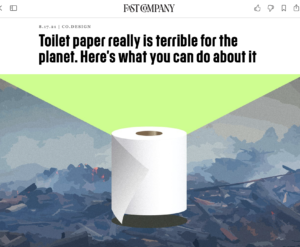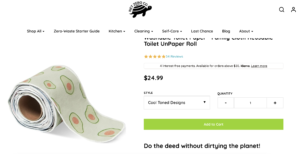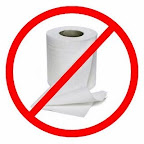Let me stop you there for a second. When you say ‘reusable’ do you mean like wipe shit on it, wash it, and use it again? Or using toilet paper made from recycled materials
— El Niño (@WizKidx703) January 10, 2022
If this is a real website, then they want you to wash the feces off and reuse.
Washable Toilet Paper Family Cloth Reusable Toilet Paper Rollhttps://t.co/25w0Zv12IB
— Marc Morano (@ClimateDepot) January 10, 2022
Washable Toilet Paper – Family Cloth Reusable Toilet UnPaper Roll
Did you know that 27,000 trees get flushed down the toilet daily?
Fortunately, our family cloth toilet paper provides a cost-effective and eco-friendly way to clean yourself without creating waste or spending a mini fortune over time.
Whereas traditional toilet paper allows you to practice good hygiene at the planet’s expense, our washable toilet paper provides a fabulous alternative that leaves you feeling squeaky clean in both body and mind!
Consciously crafted from single-ply 100% cotton flannel with stitched edges, these reusable toilet paper rolls fit effortlessly on any traditional toilet paper holder.
Who knew cleaning up after yourself could be so cute and rewarding?
To use:
- Use dry or damp with water (recommended dry for #1, wet for #2)
- After use, collect in large cotton mesh bag/hamper until wash day (recommended twice a week)
- Machine wash hot with like colors. Tumble dry low or air dry. You may choose to pre-soak with vinegar/cleaning solution.
- Once dry, re-roll one at a time. Voila!
#
https://www.healthline.com/health/reusable-toilet-paper
Reusable toilet paper is based on a similar concept to cloth diapers. You use strips, squares, or other configurations of cloth in replacement of toilet paper.
When you’re done with the cloths, you place them in a container, clean them, and use them again.
If you haven’t started searching the internet already, sellers or proponents of reusable toilet paper may also call it:
- cloth wipes
- family cloth
- reusable toilet wipes
- un-toilet paper
- upcycled toilet paper
Some people may make their own reusable toilet paper using old clothing or other fabrics they no longer use, such as sheets, towels, or blankets. Others may purchase it from online sites, such as Etsy or other retailers.
It’s one thing to use cloth wipes for a single use, but is it safe to use them over and over again, as well as share them among family?
Paper originated in China in the 2nd century B.C., as did the first recorded use of paper for wiping purposes.
Toilet paper became commercially available in the Western world in 1857, when Joseph Gayetty of New York marketed packages of 500 sheets for 50 cents.
Since that time, alternatives to toilet paper haven’t been fully explored. There’s little information or research studies about the safety, precautions, or cleaning of reusable toilet paper.
The major concern isn’t the initial use of reusable toilet paper — it’s the handling and cleaning of the paper afterward. Here’s a general overview of the process:
- Post-use storage. Internet searches reveal most people put the soiled cloths in some kind of container. These include a hamper lined with a plastic garbage bag or a pail or other container that has a solution with vinegar, peroxide, or other antibacterial chemicals.
- Handling. Once the receptacle is full, you must handle the cloths in some manner to safely transfer them to the washing machine. If you wear gloves to do this, know how to remove the gloves to avoid contaminating your skin. Also be sure to wash your hands carefully with soap and water after loading.
- Washing. The major bacteria to worry about with reusable toilet paper is E. coli. This bacterium can be found in the digestive tract (and sometimes urine) and can cause serious stomach upset. It requires temperatures at high heat combined with bleach to kill. Otherwise, it’s possible the bacteria are still present. Whatever you and the cloths touch can potentially contaminate surfaces — not to mention whatever you wash next in your washing machine. If your washing machine has a sanitize setting, use it.
These considerations are why many people are understandably skeptical over a reusable toilet paper revolution.
Toilet paper is largely biodegradable. Septic systems (and the bacteria that feed off them within) usually make quick work of toilet paper.
If your concern regarding using toilet paper is an environmental one, it’s important to consider the energy costs that come with achieving hot water and the amount of water and bleach needed to thoroughly wash the cloths.
#
Related:
https://twitter.com/DawnTJ90/status/1480599690802450435

#
‘I don’t do laundry. I don’t use toilet paper. I haven’t bought any clothes in probably eight years. The last time I bought underwear was probably 1998.’
UN takes away toilet paper to get rid of media as the stench of Rio failure fills the air! Media complains ‘No toilet paper, no water, & tables being moved from underneath us’–‘RioPlus20 clearing out media before they can start the editorials’
Excerpt: Diaperless Babies Seen As Earth-Friendly Solution – Critics Deride As ‘Primitive-Worship’ – CNSNews.com – April 22, 2004 – Excerpt: Citing concerns about plastic disposable diapers clogging landfills and the amount of washing and detergents that cloth diapers require, many environmentalists are taking a page from tribal cultures and seeking to eliminate the use of the baby diapers altogether. The green movement is now promoting diaperless babies as a “retro, cutting-edge, environmentally friendly scheme” to mothers throughout the industrialized world. […] “There is a way to have a baby and NOT use diapers,” says one website advocating diaperless babies. Parents are urged to get in tune with their infant’s body signals and hold babies over toilets, buckets and shrubbery or any other convenient receptacle when nature calls. […] One advocate suggests bringing a “tight-lidded bucket” along to serve as a waste receptacle when mothers take their babies out in public. ‘Primitive worship’ But Robert Bidinotto, publisher of ecoNOT.com and a critic of environmentalists, dismisses such notions as “primitive-worship.” “Incredibly, some environmentalists actually prefer that the foul messes we normally capture in diapers and landfills, spill instead onto our linoleum, carpets, and even our children,” Bidinotto told CNSNews.com. Noting many greens’ opposition to flush toilets and now baby diapers, Bidinotto said environmentalists’ have a “strange affinity for bodily wastes,” and he believes they have become “obsessed with toilet issues.”
NYT: No roughing it: Greens target toilet paper manufacturers for making ‘soft and comfortable’ tissue – Mr. Whipple Left It Out: Soft Is Rough on Forests – February 26, 2009
Excerpt: Americans like their toilet tissue soft: exotic confections that are silken, thick and hot-air-fluffed. […]But fluffiness comes at a price: millions of trees harvested in North America and in Latin American countries, including some percentage of trees from rare old-growth forests in Canada. Although toilet tissue can be made at similar cost from recycled material, it is the fiber taken from standing trees that help give it that plush feel, and most large manufacturers rely on them. Customers “demand soft and comfortable,” said James Malone, a spokesman for Georgia Pacific, the maker of Quilted Northern. “Recycled fiber cannot do it.” The country’s soft-tissue habit — call it the Charmin effect — has not escaped the notice of environmentalists, who are increasingly making toilet tissue manufacturers the targets of campaigns. Greenpeace on Monday for the first time issued a national guide for American consumers that rates toilet tissue brands on their environmental soundness. With the recession pushing the price for recycled paper down and Americans showing more willingness to repurpose everything from clothing to tires, environmental groups want more people to switch to recycled toilet tissue. “No forest of any kind should be used to make toilet paper,” said Dr. Allen Hershkowitz, a senior scientist and waste expert with the Natural Resource Defense Council. […]Other countries are far less picky about toilet tissue. In many European nations, a rough sheet of paper is deemed sufficient. Other countries are also more willing to use toilet tissue made in part or exclusively from recycled paper.
Excerpt: “Natural living” advocates unveil their latest planet-saving invention – the reusable toilet wipe. Surely it’s time global warming believers marked their houses with some sign, a green pentangle or something, as a warning to visitors to enter at their own risk. (Thanks to reader Marc Morano.)
American taste for soft toilet roll ‘worse than driving Hummers’ – UK Guardian – February 26, 2009
Excerpt: Extra-soft, quilted and multi-ply toilet roll made from virgin forest causes more damage than gas-guzzlers, fast food or McMansions, say campaigners. The tenderness of the delicate American buttock is causing more environmental devastation than the country’s love of gas-guzzling cars, fast food or McMansions, according to green campaigners. At fault, they say, is the US public’s insistence on extra-soft, quilted and multi-ply products when they use the bathroom.
“This is a product that we use for less than three seconds and the ecological consequences of manufacturing it from trees is enormous,” said Allen Hershkowitz, a senior scientist at the Natural Resources Defense Council. “Future generations are going to look at the way we make toilet paper as one of the greatest excesses of our age. […] “I really do think it is overwhelmingly an American phenomenon,” said Hershkowitz. “People just don’t understand that softness equals ecological destruction.”




